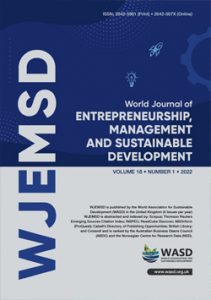Entrepreneurial ecosystems during COVID-19: the survival of small businesses using dynamic capabilities, Dr. Sumayya Rashid and Dr. Vanessa Ratten
Dr. Sumayya Rashid, Dr. Vanessa Ratten
Department of Management, Sport and Tour ism
ism
La Trobe University, Melbourne
Australia
Email: v.ratten@latrobe.edu.au
DOI: 10.1108/WJEMSD-09-2020-0110
Purpose: The world is going through a global crisis after the outbreak of coronavirus (COVID-19) in most areas of the world. Businesses particularly small ones do not work in isolation but instead are embedded in an entrepreneurial ecosystem that is dependent on environmental conditions. The disruptive changes from COVID-19 have caused serious damage to the global economy, so it is up to entrepreneurs to bring equilibrium by introducing change. This paper adopts the lens of dynamic capabilities to study how small business entrepreneurs are trying to survive and grow in an entrepreneurial ecosystem affected by coronavirus.
Design/methodology/approach: Using qualitative research methods, 20 Pakistani entrepreneurs have been interviewed in order to assess how the entrepreneurial ecosystem in an emerging economy has been affected by COVID-19. This enables a contemporary and realistic understanding about the way small business entrepreneurs have adjusted to a crisis.
Findings: From the data analysis, the three main dimensions of dynamic capabilities for small business entrepreneurs emerge, which involve a sensing, seizing and transforming capability.
Research limitations/implications: The findings suggest that small businesses utilise the following strategies to cope with change: emergent humanitarian crisis, carte blanche agile business models and effectual business functions. These findings contribute to the literature about the challenges of current crises and how businesses can cope in this situation using a dynamic capabilities perspective.
Practical implications: The findings contribute to the ability of small businesses to cope during the current pandemic situations and anticipate how to manage future crises. Furthermore, the entrepreneurial practices exercised by small businesses are also presented that represent an innovative way to understand crisis management techniques by entrepreneurs in emerging economies.
Social implications: These findings contribute to the literature about the challenges of current crises and how businesses can cope in this situation using a dynamic capabilities perspective.
Originality/value: By drawing on the existing literature of COVID-19's impact on businesses, the theoretical contribution of this paper highlights the applicability of dynamic capabilities on small businesses to survive during the global crisis.
Keywords: Coronavirus; Covid-19; Dynamic capabilities; Emerging economy; Entrepreneurial ecosystem; Pakistan; Small business entrepreneurs.
Citation: Rashid, S. and Ratten, V. (2021), "Entrepreneurial ecosystems during COVID-19: the survival of small businesses using dynamic capabilities", World Journal of Entrepreneurship, Management and Sustainable Development, Vol. 17 No. 3, pp. 457-476. https://doi.org/10.1108/WJEMSD-09-2020-0110

